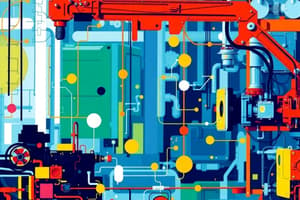Podcast
Questions and Answers
What role does advanced robotics play in Industry 4.0?
What role does advanced robotics play in Industry 4.0?
- They interact with humans and learn from them. (correct)
- They eliminate the need for human workers entirely.
- They require constant human supervision to operate.
- They are primarily used for simple repetitive tasks.
Which technology is essential for achieving real-time responses in manufacturing?
Which technology is essential for achieving real-time responses in manufacturing?
- Industrial Internet of Things (IIoT) (correct)
- Big data analytics
- Cloud-based services
- Additive Manufacturing
How does AI/cognitive computing contribute to manufacturing processes in Industry 4.0?
How does AI/cognitive computing contribute to manufacturing processes in Industry 4.0?
- By replacing human decision-making entirely.
- By only improving data storage capabilities.
- By enhancing quality, efficiency, and reliability. (correct)
- By simplifying existing technologies without further enhancements.
What benefits do advanced simulations provide in Industry 4.0?
What benefits do advanced simulations provide in Industry 4.0?
Which pillar of Industry 4.0 focuses on securing communications and data flows?
Which pillar of Industry 4.0 focuses on securing communications and data flows?
What is the primary advantage of additive manufacturing in an Industry 4.0 environment?
What is the primary advantage of additive manufacturing in an Industry 4.0 environment?
What is a key feature of cloud-based service-enabling technologies in Industry 4.0?
What is a key feature of cloud-based service-enabling technologies in Industry 4.0?
What is the main challenge of managing big data in the industrial sector?
What is the main challenge of managing big data in the industrial sector?
How does the Industrial Internet of Things (IIoT) contribute to manufacturing processes in Industry 4.0?
How does the Industrial Internet of Things (IIoT) contribute to manufacturing processes in Industry 4.0?
What role does cloud-based technology play in Industry 4.0 manufacturing operations?
What role does cloud-based technology play in Industry 4.0 manufacturing operations?
In what way does big data analytics improve production quality in Industry 4.0?
In what way does big data analytics improve production quality in Industry 4.0?
Why is cyber security considered crucial in Industry 4.0 environments?
Why is cyber security considered crucial in Industry 4.0 environments?
What advantages do advanced simulations offer in product development within Industry 4.0?
What advantages do advanced simulations offer in product development within Industry 4.0?
How do advanced robotics enhance safety in Industry 4.0?
How do advanced robotics enhance safety in Industry 4.0?
Explain the significance of additive manufacturing in the context of Industry 4.0.
Explain the significance of additive manufacturing in the context of Industry 4.0.
How does AI and cognitive computing influence manufacturing efficiency in Industry 4.0?
How does AI and cognitive computing influence manufacturing efficiency in Industry 4.0?
Flashcards are hidden until you start studying
Study Notes
Industry 4.0 Pillars
-
Big data/advanced analytics: Analyzing vast amounts of product and process data can lead to optimized production quality, improved services, and faster, accurate decision making.
-
Advanced robotics: Robots are becoming more flexible, cooperative, and autonomous, enabling them to interact with each other, work safely with humans, and learn from human input.
-
Advanced simulations: 3D simulations can test and optimize product development, material development, and production processes before actual production begins, allowing for maximized efficiency.
-
AI/cognitive computing: Cognitive manufacturing uses the power of the Industrial Internet of Things (IIoT), advanced data analytics, and cognitive technologies (AI and machine learning) to improve quality, efficiency, and reliability in manufacturing processes.
-
Industrial Internet of Things (IIoT): The IIoT connects products through internet-enabled devices, utilizing standard protocols for enhanced communication and data exchange. This decentralizes analytics and decision-making, enabling real-time responses to changing manufacturing needs.
-
Cyber security: Industry 4.0 environments rely on secure and reliable communications protocols, as well as sophisticated identity and access management systems, to protect data and communication flows within the system.
-
Additive Manufacturing: This form of manufacturing is ideal for producing small-batch, customized, and high-performance products in Industry 4.0 environments.
-
Cloud-based service-enabling technologies: Industry 4.0 requires increased data sharing across locations and companies. Cloud-based data storage and management facilitates the development of Manufacturing Execution Systems (MESs) that utilize cloud-based machine data.
Pillars of Industry 4.0
- Big Data & Advanced Analytics: Analysing industrial data can optimize production, improve services and facilitate faster decision-making.
- Advanced Robotics: Robots are becoming more flexible, cooperative, and autonomous, working safely alongside humans, and learning from them.
- Advanced Simulations: 3D simulations enable testing and optimization of product development, material development, and production processes before actual production.
- AI & Cognitive Computing: Utilizing IoT, advanced data analytics, AI, and machine learning improves manufacturing quality, efficiency, and reliability.
- Industrial Internet of Things (IIoT): Products incorporate internet-connected devices that communicate using standard protocols, decentralizing analytics and decision-making, enabling real-time responses.
- Cyber Security: Industry 4.0 security systems include connectivity and communications protocols, sophisticated identity and access management systems, ensuring secure and reliable data flow.
- Additive Manufacturing: This method is ideal for producing small-batch, customized, and high-performance products.
- Cloud-based Service-enabling Technologies: Cloud-based data storage and management drive the development of manufacturing execution systems (MESs) that utilize cloud-based machine data.
Studying That Suits You
Use AI to generate personalized quizzes and flashcards to suit your learning preferences.




